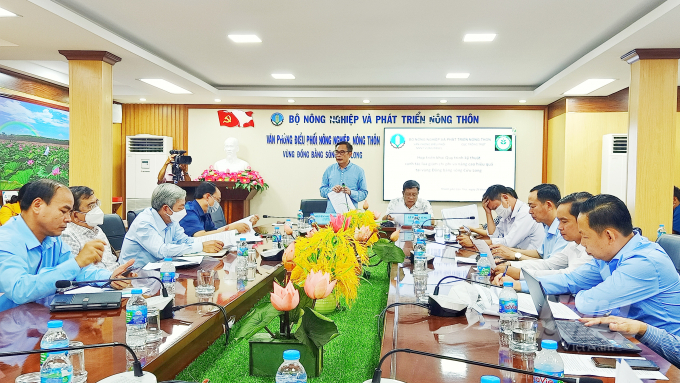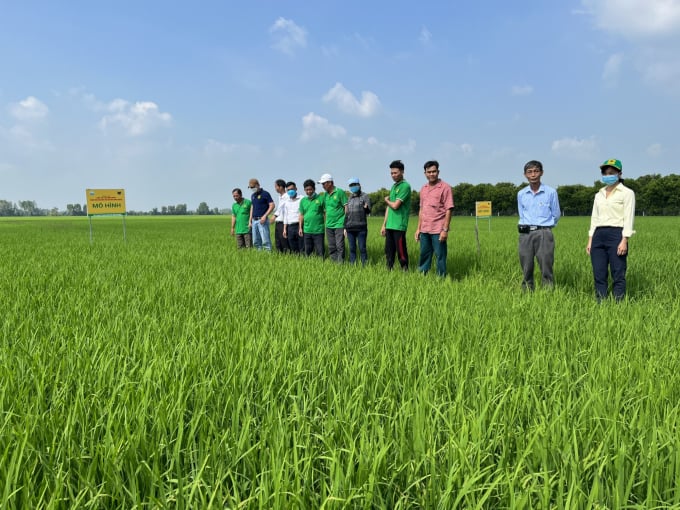June 17, 2025 | 05:35 GMT +7
June 17, 2025 | 05:35 GMT +7
Hotline: 0913.378.918
June 17, 2025 | 05:35 GMT +7
Hotline: 0913.378.918
On April 26, the Department of Crop Production and the Mekong Delta Agriculture and Rural Coordination Office (MARD) organized the implementation of a technical rice farming procedure that reduces costs and improves efficiency for leaders of Departments of Agriculture and Rural Development, Sub-Departments of Crop Production and Plant Protection in Mekong Delta regions.

Mr. Nguyen Nhu Cuong (standing), Director of the Department of Crop Production (MARD), announced the decision on the recognition of technical procedures in the field of crop production. Photo: Kim Anh.
The Department of Crop Production assessed that the technical procedure would create a new wave of production cost reduction throughout the region, showing positive results in a short amount of time, and creating momentum for better changes in society.
According to the Decision on the Recognition of Technical Procedures in the field of crop production issued by the Department of Crop Production (MARD) on April 25, 2022, the Mekong Delta cost-reducing rice farming procedure included seven specific stages applied to winter-spring and summer-autumn crops: land preparation; seed preparation; fertilizer; effective water management; pest management; harvesting and post-harvesting; geographic range of procedure application.
Depending on each season, ecological conditions, weather and group of varieties, the amount of seed sown must not exceed 80 kg/ha for the scattered sowing method (manual, seed sprayer), row sowing and 60kg/ha in the case of the cluster sowing method. A reduction in the amount of seeds will lead to a reduction in fertilizers and pesticides.

Many provinces, local units and businesses in the Mekong Delta have boldly applied advanced rice production procedures to reduce production costs. Photo: LHV.
Leaders of the local agriculture sector highly regarded the process of reducing farming costs issued by the Department of Crop Production. According to preliminary calculations of localities, this procedure could lower the cost of rice production by 15%. After the meeting, localities in the Mekong Delta would quickly spread the word and deploy to farmers, contributing to managing and improving rice production efficiency.
As stated by Mr. Nguyen Nhu Cuong, Director of the Department of Crop Production, the Mekong Delta cost-reducing rice farming procedure was basically a "soft model", flexible for every season and production conditions of the regions. In each specific location the crop production sector would continue to review, evaluate and propose adjustments accordingly.
"Rome wasn't built in a day. If you want to change people's perception, you must have a resolute implementation plan, change your mindset and production habits with rice and other crops," said Mr. Cuong.
The Department of Crop Production will continue to research and issue a number of cost reduction procedures applicable to other key crops in the near future.
Over the past time, many localities, businesses and cooperatives in the Mekong Delta have boldly applied advanced rice production and smart farming procedures along with many technical advances such as "3 decrease 3 increase", "1 must 5 decrease", integrated pest management (IPM), alternate flooding - dry irrigation techniques, and shallow - open - dry cost-saving irrigation method.
These are important prerequisites and practices for the Department of Crop Production to issue more technical rice farming procedures that can effectively reduce costs and improve production efficiency in the Mekong Delta.
Translated by Samuel Pham
![Turning wind and rain into action: [4] Bringing climate bulletins to remote and isolated areas](https://t.ex-cdn.com/nongnghiepmoitruong.vn/608w/files/linhnhp/2025/06/14/1152-z6704423696987_15fd32ffc26d590d204d520c9dac6786-nongnghiep-151141.jpg)
(VAN) The Vietnam Agriculture and Nature Newspaper interviewed Mr. Vu Thai Truong, Acting Head of Climate Change and Environment at UNDP Vietnam, to gain deeper insight into how climate bulletins are delivered to farmers.

(VAN) In Tien Giang, a high-tech shrimp farm has developed a distinctive energy-saving farming model that has yielded promising results.
![Turning wind and rain into action: [3] 300.000 farmers benefit from agro-climatic bulletins](https://t.ex-cdn.com/nongnghiepmoitruong.vn/608w/files/news/2025/06/12/e5a48259d6a262fc3bb3-nongnghiep-125122.jpg)
(VAN) The agro-climatic bulletin has become a valuable tool for farmers in the Mekong Delta. After more than five years of implementation, the initiative is gradually being expanded nationwide.
![Turning wind and rain into action: [2] Providing forecasts to the people](https://t.ex-cdn.com/nongnghiepmoitruong.vn/608w/files/news/2025/06/12/e5a48259d6a262fc3bb3-nongnghiep-103927.jpg)
(VAN) In addition to improving the quality of hydrometeorological forecasts, putting forecast bulletins into practical use is crucial for production and disaster prevention.

(VAN) Blue carbon is receiving attention for its rapid absorption capacity and vast potential. It represents a promising nature-based solution to respond to climate change.
/2025/06/11/3507-1-161904_583.jpg)
(VAN) Seagrass beds and coral reefs serve as 'cradles' that nurture life in the ocean depths, creating rich aquatic resources in Vietnamese waters.
![Turning wind and rain into action: [1] Forecasting for farmers](https://t.ex-cdn.com/nongnghiepmoitruong.vn/608w/files/news/2025/06/11/e5a48259d6a262fc3bb3-nongnghiep-111919.jpg)
(VAN) Weather is no longer just a matter of fate. Forecasts have now become an essential companion for farmers in every crop season.